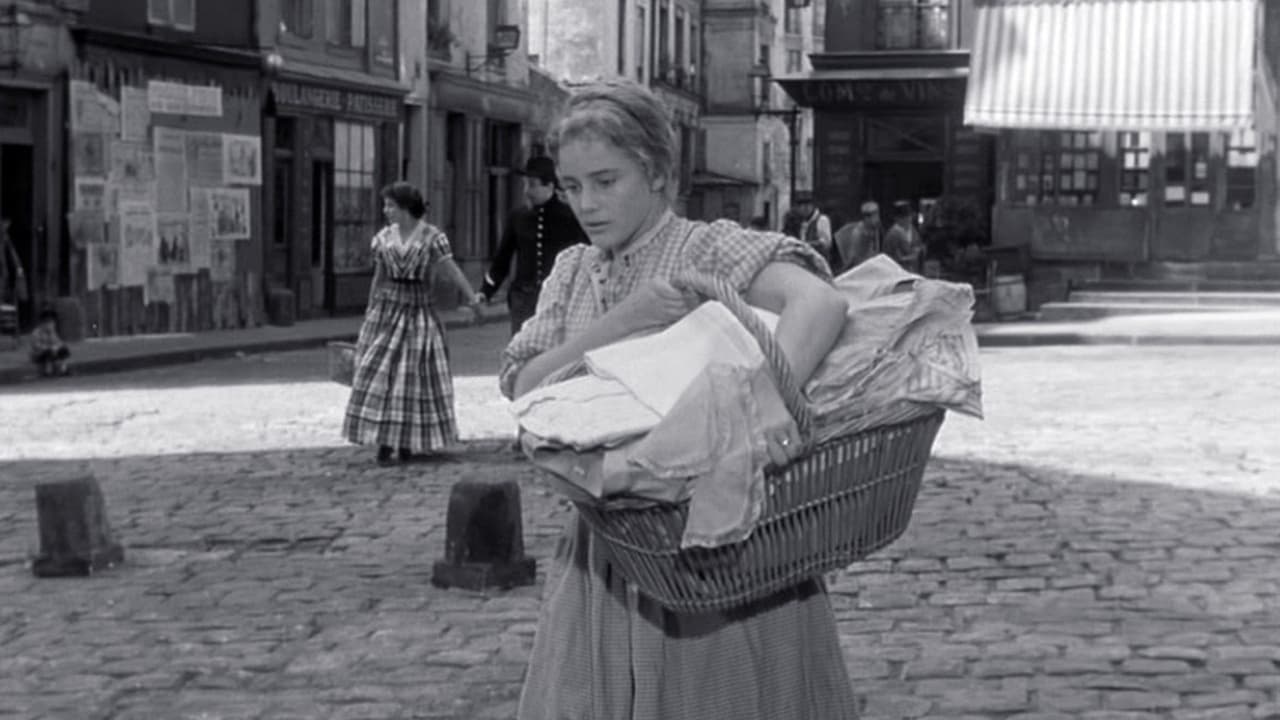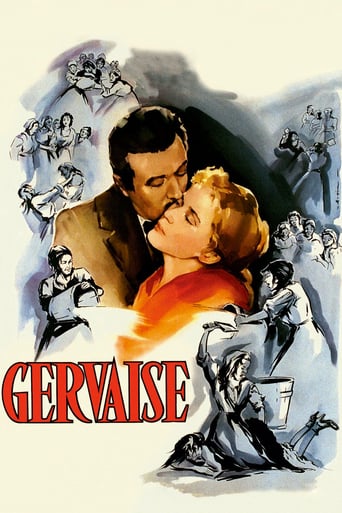

This black and white adaptation of Zola's Gervaise is extremely well-acted and filled with pathos. From the gaiety of the early scenes, the audience is drawn into Gervaise's downward spiral and struggle in an impoverished, uncaring society.The cinematography conveys a sense of bleakness as do the costumes and settings. However, pacing is a problem. Whilst the most cinematographic sequence in the film (the fight between the women) occurs at the outset and gives the narrative a fast-paced introduction, the tempo slows a little too much during later portions.The sequence of the fall from the roof is also poorly-executed and appears more like slapstick comedy than tragedy.Aside from these two scenes, there is little action, so at times the film feels a little too much like a stage play. The cinematography is quite static as well which works well in some scenes but not in others. There are few close-ups to convey the characters thoughts and far too much middle-distance filming which distances the viewers from the action.Although it has its flaws, this is still a more effective attempt to capture Zola's work on film than the previous year's version of Nana.
... View MoreI've always felt "La Assommoir" by Zola, the most depressing, heart wrenching book I have ever read. It was almost as if Zola was saying, if you are decent, hard working and try to better yourself and you are a woman, your life will be paved with misery. It is one book I have never been able to reread. Initially, in the book Gervaise is seen as a lovely young mother determined to do her best at honest work for her children as her horrible lover leaves her to escape family responsibility. She meets a roofer Henri, who worships her - and it is all down hill from there. In keeping with Zola's character tie-ins (most of his books were linked), one of her children is Nana, the subject of Zola's most acclaimed book. For some strange reason I felt drawn to the movie - I wanted to see if there was any hope or brightness that I had missed in the book.This amazing movie starts with a burst of life - a huge fight in the laundry among hot, sudsy buckets of water between Gervaise and Virginie, the sister of the woman who has run off with Gervaise's lover, Lanier, with whom she has had two children. The viciousness and the brutality of the fight is shocking. Gervaise is triumphant, but it is one of the last times she does triumph.Eventually Gervaise marries - to a good man Henri, who adores her and they eventually have a little girl, Nana. There is also another Zola reference to Therese Raquin, when Henri's sister comments on Gervaise's striking resemblance to Therese "the one who died of consumption". Gervaise longs to have her own laundry but on the day her dreams are to be realised Henri has a horrible accident. He falls off a roof and because of Gervaise's insistence on nursing him herself (instead of taking him to the free hospital) it takes all their savings and prolongs his recovery to six months. At the end of which Henri is a hopeless alcoholic and permanently unemployable. Through the efforts of their good friend Goujet,a blacksmith (who is in love with Gervaise) she is able to open her own laundry but Henri when he is not being a nuisance in the shop, has taken to pawning the laundry items for drinking money. This is the beginning of the end - Virginie comes back to the street with her husband Mr. Fish, who is a policeman and even though she warmly embraces Gervaise and wants to put the fight behind them, she is a false friend and a troublemaker. Lanier then turns up and the drunken Henri makes a companion of him, even inviting him to take up residence with them as a permanent boarder. Definitely not as black as the book which goes into minute detail of Gervaise's descent into drunkenness, even ending with her living in the tiny closet that Old Bru lived in. During this time Goujet has gone to prison for inciting the impoverished workers to fight for an extra 5 cents a week. When he comes out and sees the living arrangements between her and Henri and Lanier, he wants nothing more to do with her but agrees to take on her eldest son as an apprentice. The film ends with Gervaise sitting numbly in the tavern while Nana, now a child of the streets, makes herself pretty with grubby ribbons. Maria Schell is just perfect, exactly how I imagined Gervaise would be but for a more uplifting Zola book I would recommend "Ladies Delight", about a young woman who works her way up (virtuously!!) to a powerful position in a department store.
... View MoreThis is a beautifully made, but terribly sad film, based on one of Emile Zola's most depressing stories of French life in the 1800s.Gervaise is a poor woman with a poorer choice of men. She is loving, smart, and industrious, but falls for superficial, lazy drunks who take advantage of her. While she tries to provide for her family by following her dream of owning her own shop, her husband drinks away the profits and complicates her life by inviting her former lover to live in their house.I can't say enough good things about Maria Schell's glowing performance as a tragic heroine. Her beautiful, expressive face is impossible to forget, and her emotional range is impressive. The rest of the cast is also pitch-perfect, from her various neighbors and clients, down to the lovely little girl who plays daughter Nana with touching sadness.Surgeon general's warning: don't watch this film while under the influence of alcohol or mood- depressing drugs. It might push you over your limit.
... View MoreWhy Maria Schell?If you have read Zola's masterpiece -"l'assommoir" the seventh of the Rougon Macquart saga,and one of the finest, surpassed only by "Germinal"- ,you wonder why Clement chose her when the part was tailor made for Simone Signoret.On the other hand ,Suzy Delair was the ideal Virginie Poisson,hypocrite venomous and vile .They say her buttocks were "dubbed" (by Liliane Montevecchi's) during the famous scene of the spanking ! René Clément did a good job even if his adaptation seemed sometimes tame and timid .Zola's depictions are so intense that it's hard to transfer them to the screen.But the " fête de Gervaise " ,with the gargantuan meal comes close to fully recreate it,and it was not easy since in the book it spreads over about twenty pages.Despise some reservations,this is an unqualified must for good cinema lovers.
... View More